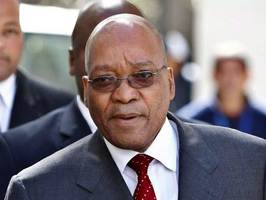New S.Africa president stresses unity; new cabinet
 Cape Town - South Africa's new caretaker president Kgalema Motlanthe moved quickly to soothe frayed nerves at home and among the investor community after being sworn in as a successor to outgoing president Thabo Mbeki.
Cape Town - South Africa's new caretaker president Kgalema Motlanthe moved quickly to soothe frayed nerves at home and among the investor community after being sworn in as a successor to outgoing president Thabo Mbeki.
Former trade union leader and longtime African National Congress member Motlanthe, 58, was elected to lead the country for the next six or seven months in a landslide vote in the National Assembly.
Within an hour, the politician who - despite occupying senior positions in the ruling party for 11 years - is little known to the general public, announced a largely unchanged new cabinet.
Stressing the importance of continuity at a time of global financial uncertainty, Motlanthe, who is expected to be replaced after the elections by ANC leader Jacob Zuma, said: "Mine is not the desire to deviate from what is working. It is not for me to reinvent policy, nor do I intend to reshape government or the public service."
Accordingly, popular Finance Minister Trevor Manuel - news of whose resignation had sparked a brief nosedive in local financial markets earlier this week - regains his post, as does Foreign Minister Nkosazana Dlamini-Zuma.
Motlanthe announced new defence, justice and public services ministers, among others. Some of the posts had been left vacant when 14 ministers and deputy ministers resigned in a shock move Tuesday. A small number, like Manuel, had indicated that they wanted to be invited back by Motlanthe.
Motlanthe also reshuffled a few posts.
Controversial Health Minister Manto Tshabalala-Msimang, dubbed Dr Beetroot by her critics over her past promotion of vegetable remedies for HIV/AIDS, was demoted to minister in the presidency.
In his inaugural speech, Motlanthe stressed unity and the government's commitment to improving the lot of South Africans, amid signs of disgruntlement among the electorate over the bloodletting in the ruling party.
Mbeki was forced to resign by the ANC over a court finding of political interference in the prosecution of ANC leader Jacob Zuma.
"It is as important as ever that we stand united as a nation," said Motlanthe, who swapped his trademark African tunics for a light grey suit for the occasion.
"We stand here to send out a message that government remains on course to deliver on its commitments to the poor," he added, listing healthcare, unemployment and tackling crime among his priorities.
Motlanthe faced little opposition on the path to president - a post he has said several times he does not particularly covet.
The candidate of the main opposition Democratic Alliance took only 50 votes to Motlanthe's 269 votes in the secret ballot. Zuma, who is not an MP, watched the vote from the speakers gallery. Mbeki was not present.
Born on July 19, 1949 to a family of 13 children in Alexandra township near Johannesburg, Motlanthe spent ten years as a young man in prison on Robben Island for resistance apartheid, rubbing shoulders with ANC stalwarts like Nelson Mandela and Walter Sisulu.
A former secretary-general of the National Union of Mineworkers and later of the ANC with a conciliatory style, he has served as a bridge between the Zuma and Mbeki factions within the party.
At the party conference in December 2007, where Zuma trounced Mbeki for ANC leader, Motlanthe became deputy president.
He had been tipped to take over from Zuma, in the event that Zuma, who has been dogged by allegations of corruption, could not assume or retain the presidency.
Telling the story of an Afrikaaner settler who mistook a lion for a horse in the dark, the leader of the Freedom Front Plus, Pieter Mulder asked Zuma Thursday in parliament: "Does the ANC also know how to unharness a lion should it be necessary?"
Political analyst Adam Habib ruled out Motlanthe upstaging Zuma, saying: "The path to Union Buildings (seat of government in Pretoria) is not in contest."
Motlanthe's election was generally welcomed by opposition leaders, who hailed him as a man of integrity, who has been unafraid to denounce the remarks of ANC hardliners, including ANC Youth League leader Julius Malema, who vowed he was ready to "kill" for Zuma. (dpa)